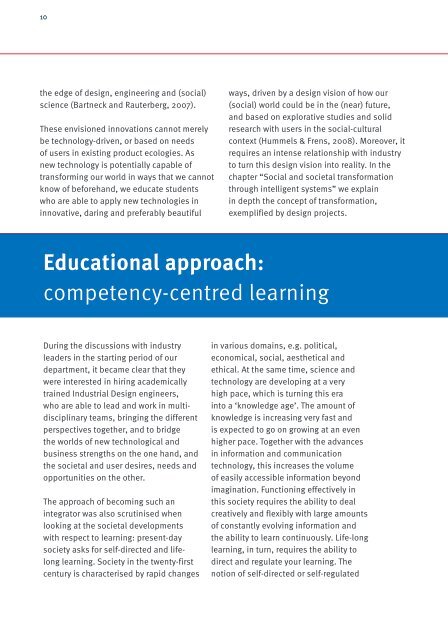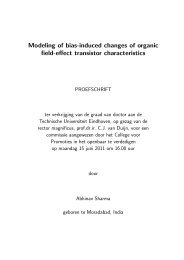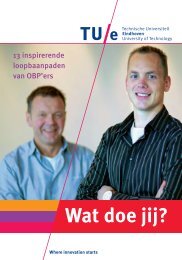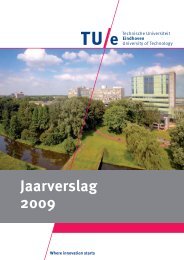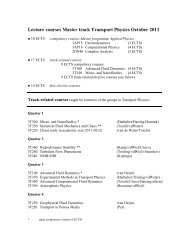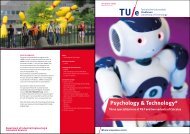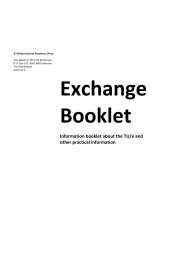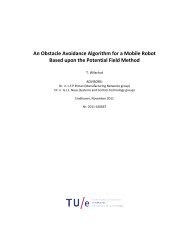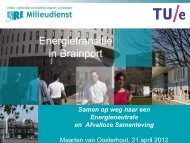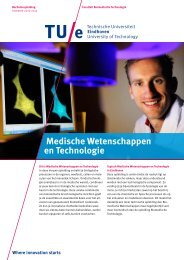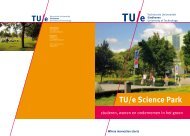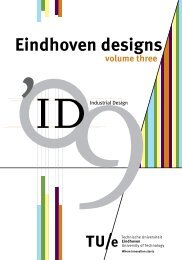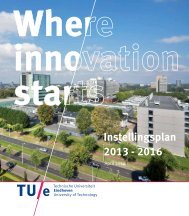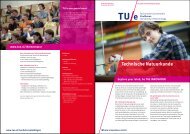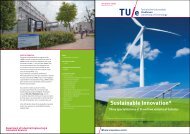Education guide 'Eindhoven designs' - Technische Universiteit ...
Education guide 'Eindhoven designs' - Technische Universiteit ...
Education guide 'Eindhoven designs' - Technische Universiteit ...
Create successful ePaper yourself
Turn your PDF publications into a flip-book with our unique Google optimized e-Paper software.
10<br />
the edge of design, engineering and (social)<br />
science (Bartneck and Rauterberg, 2007).<br />
These envisioned innovations cannot merely<br />
be technology-driven, or based on needs<br />
of users in existing product ecologies. As<br />
new technology is potentially capable of<br />
transforming our world in ways that we cannot<br />
know of beforehand, we educate students<br />
who are able to apply new technologies in<br />
innovative, daring and preferably beautiful<br />
ways, driven by a design vision of how our<br />
(social) world could be in the (near) future,<br />
and based on explorative studies and solid<br />
research with users in the social-cultural<br />
context (Hummels & Frens, 2008). Moreover, it<br />
requires an intense relationship with industry<br />
to turn this design vision into reality. In the<br />
chapter “Social and societal transformation<br />
through intelligent systems” we explain<br />
in depth the concept of transformation,<br />
exemplified by design projects.<br />
<strong>Education</strong>al approach:<br />
competency-centred learning<br />
During the discussions with industry<br />
leaders in the starting period of our<br />
department, it became clear that they<br />
were interested in hiring academically<br />
trained Industrial Design engineers,<br />
who are able to lead and work in multidisciplinary<br />
teams, bringing the different<br />
perspectives together, and to bridge<br />
the worlds of new technological and<br />
business strengths on the one hand, and<br />
the societal and user desires, needs and<br />
opportunities on the other.<br />
The approach of becoming such an<br />
integrator was also scrutinised when<br />
looking at the societal developments<br />
with respect to learning: present-day<br />
society asks for self-directed and lifelong<br />
learning. Society in the twenty-first<br />
century is characterised by rapid changes<br />
in various domains, e.g. political,<br />
economical, social, aesthetical and<br />
ethical. At the same time, science and<br />
technology are developing at a very<br />
high pace, which is turning this era<br />
into a ‘knowledge age’. The amount of<br />
knowledge is increasing very fast and<br />
is expected to go on growing at an even<br />
higher pace. Together with the advances<br />
in information and communication<br />
technology, this increases the volume<br />
of easily accessible information beyond<br />
imagination. Functioning effectively in<br />
this society requires the ability to deal<br />
creatively and flexibly with large amounts<br />
of constantly evolving information and<br />
the ability to learn continuously. Life-long<br />
learning, in turn, requires the ability to<br />
direct and regulate your learning. The<br />
notion of self-directed or self-regulated


